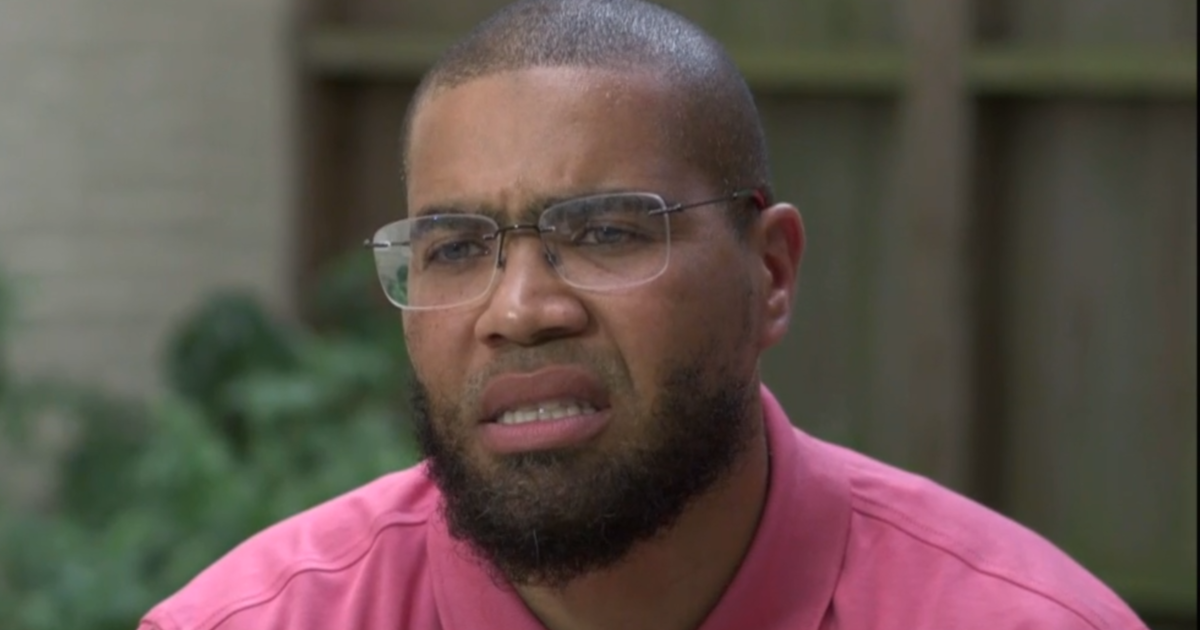Philadelphia’s district attorney is getting national attention in the fight against wrongful convictions. More wrongfully incarcerated people were exonerated of murder in Philadelphia County last year than anywhere else in America.
Since taking office in 2018, District Attorney Larry Krasner has exonerated 15 people, including 40-year-old Terrance Lewis, who was found guilty of second degree murder and sentenced to life in prison in 1999.
In 2019, Philadelphia prosecutors dropped the charges, and Lewis was released.
“At that moment, that was — that was sheer genuine joy,” Lewis told “CBS This Morning” national correspondent Jericka Duncan. “Coming from the box of despair, you know, where I was being warehoused to be able to feel the breeze on that side of the wall, and to get a genuine hug. … It’s surreal.”
That reality was just starting to set in when CBS News first met Lewis last year, 87 days after his release.
“Although I’m grateful, it’s definitely been difficult,” he said. “Because I have been enslaved, you know mentally, as well as physically.”
When asked how he felt a year after his release, Lewis said, “I would be remiss to say that you know life has been a cake walk. … Initially it felt like I was leaving one prison to come home to another prison.”
Prosecutors built their 1999 case against Lewis around the testimony of one eyewitness — a drug addict.
“I proved my innocence unequivocally speaking, factually speaking,” Lewis said.
It wasn’t until 21 years later and after the district attorney’s office expressed “really grave concerns” about whether Lewis was guilty that a judge threw out his conviction and ordered his freedom.
Lewis sued the city of Philadelphia because exonerees are not automatically entitled to compensation in Pennsylvania. Lewis alleged that police practices “including coercion … suppression of exculpatory evidence … and fabrication of evidence, violated his constitutional rights.”
This past June, the city and Lewis reached a settlement for $6.25 million.
“I did 21 and a half years for a crime that I did not commit,” Lewis said. “No money in the world can amount to what I felt inside.”
He said he’s using some of that money to fight for justice, launching the Terrance Lewis Liberation Foundation, a non-profit partnering with UPenn students to investigate claims of wrongful convictions.
“He has a sincere belief that there are innocent people sitting in jail now, which is surely true,” Krasner said about Lewis.
Lewis was inspired by Krasner, whose Conviction Integrity Unit helped restore Lewis’ freedom.
But Krasner’s made it clear from day one, he wanted to take on the entire system. In his first week in office in 2018, he fired 31 employees.
“I did not enjoy it,” Krasner told Duncan last year. “But it was necessary to do.”
Krasner said the people he fired were involved in the convictions of people who are now being exonerated. “That story will be developing. Stay tuned,” he said at the time.
“I can tell you a lot of what has done since I said, ‘Stay tuned,’ has been in the nature of education. We put a ton of time into educating the prosecutors about things like the obligation to turn over information that helps the defense,” Krasner said.
Krasner said he feels he has been effective in changing the culture, but said, “it’s a struggle.”
“And we’ve had the opportunity to become credible within the system to people who may have had misconceptions about what we were trying to do. We are just as focused on going after serious gun violence as we are focused on making sure innocent people do not sit in jail,” he said.
But, gun violence has spiked in Philadelphia. Since last year, homicides have increased about 40%.
“Almost every big city in the United States is in the same position,” Krasner said.
Asked why he thinks that is, he said, “I think there’s no question that it’s related to the pandemic. … For the first time in probably close to 100 years we have the Philadelphia court system shut down for months.”
“You have changes in policing so that police are making decisions not even to arrest for certain offenses,” he added. “When you have all of that going on you have a perfect storm.”
In spite of that storm, there is hope, Lewis said, that no matter how long it takes, justice is possible.
“I’m a believer from amongst the believers in regards to reform and eradicating the racial disparities and inequalities,” Lewis said. “I’m very hopeful that change, in fact, is going to come.”
The Philadelphia Police Department declined to comment on Lewis’ case. Lewis said he’s pushing forward with his foundation to help other wrongly incarcerated people.
